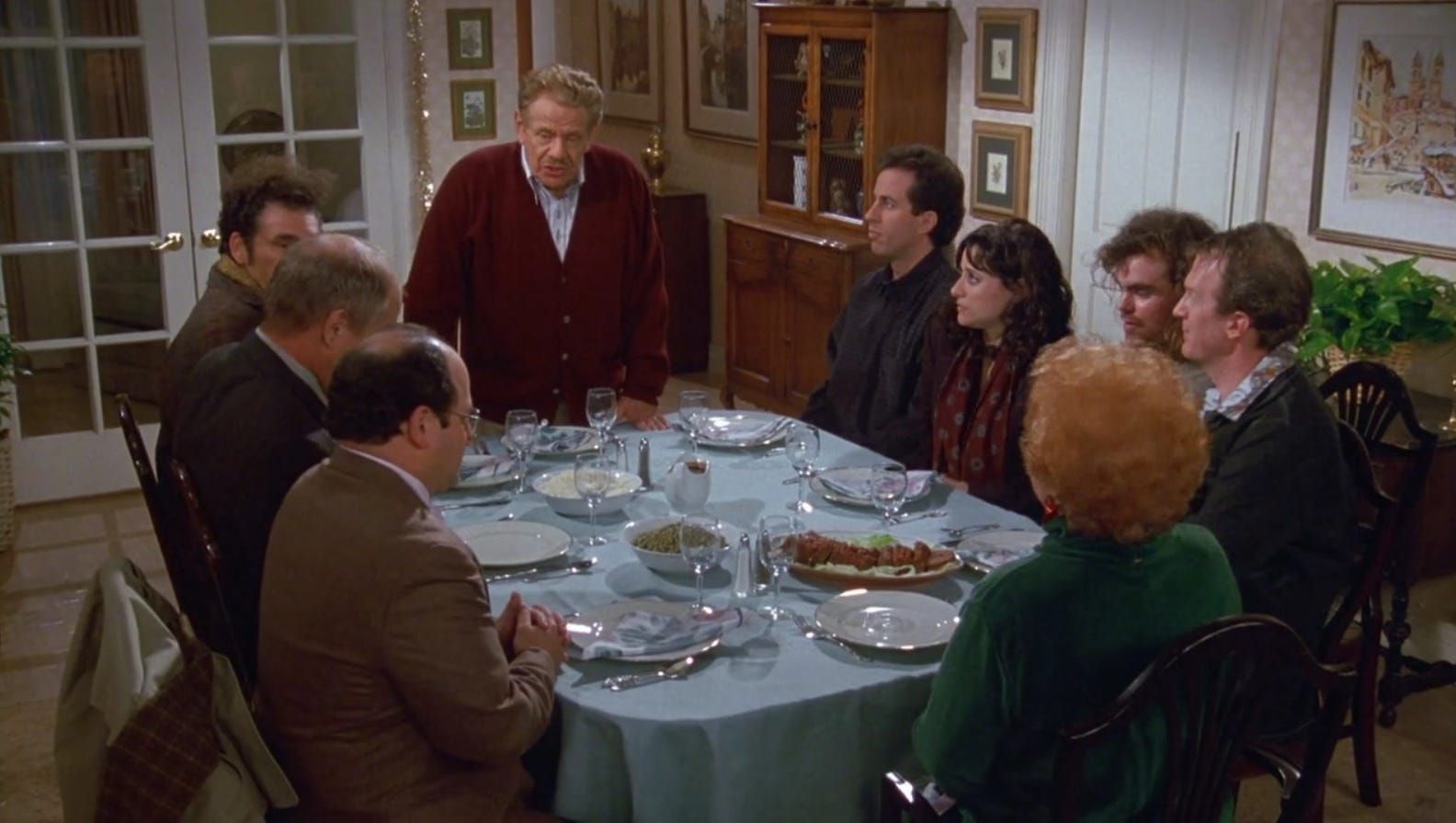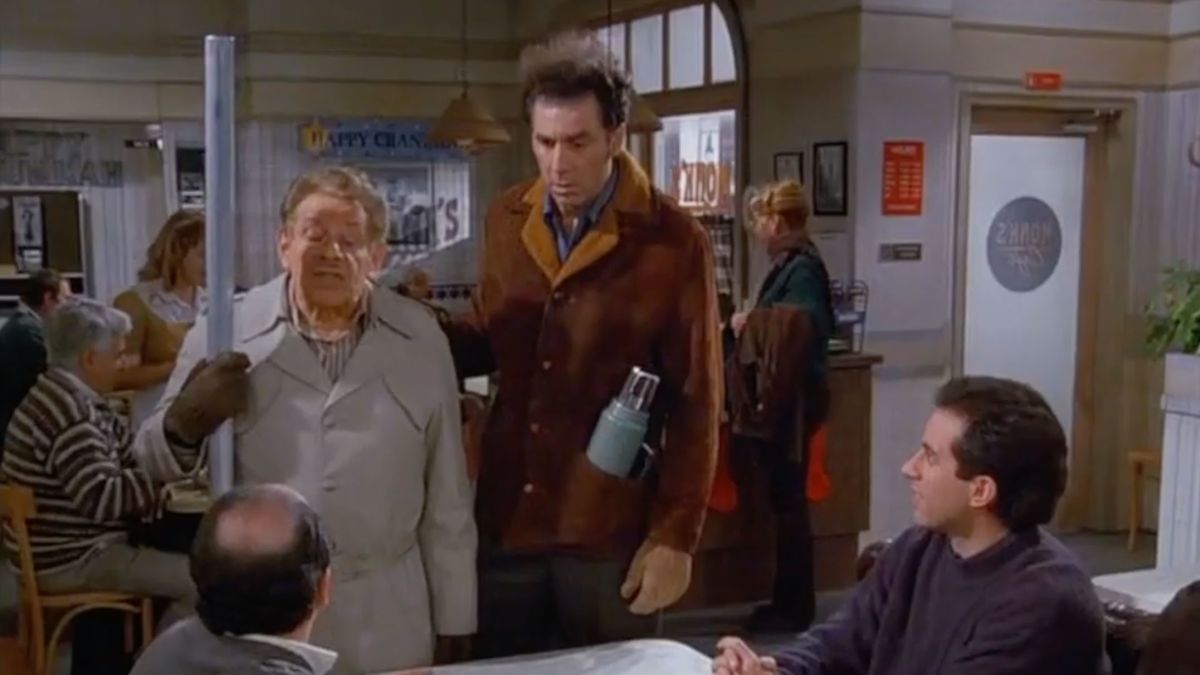If an award were to be given to the best fake holiday of all time, it would surely go to Festivus, the Christmas alternative made famous by Frank Costanza (Jerry Stiller) in the classic 1997 Seinfeld episode, "The Strike." And how could it not? With zany Festivus traditions like the Airing of Grievances, the Feats of Strength, and an aluminum pole in place of a traditional Christmas tree, Festivus is unparalleled in terms of both humor and sheer ridiculousness.
However, the events of "The Strike" aren't as fictitious as they may appear. In fact, Seinfeld writer Dan O'Keefe based the episode (and Frank's antics) on the actual holiday created and celebrated by his father (Daniel O'Keefe) in the early 1970s, proving that truth is often stranger than fiction. Despite not featuring holiday warmth, sappy lessons about the importance of family, or postcard-perfect winterscapes suited to a Hallmark movie, the episode remains essential holiday viewing for showing that just because the holidays roll around doesn't mean that everyone should suddenly turn chipper and pleasant, nor do all our negative, unwholesome traits simply just disappear. This is shown through the behavior of George (Jason Alexander), Kramer (Michael Richards), Elaine (Julia Louis-Dreyfus), and Jerry (Jerry Seinfeld) throughout the episode.
The Airing of Grievances
George is the epitome of cheapness and laziness, and these dominant traits especially surface during the Christmas season. When his friend, Tim Watly (Bryan Cranston), gives him a card stating that, "a donation has been made in your name to the Children's Alliance," George is appalled to have received a "fake" gift. “Don’t you see how wrong that is?" he says, aghast. "Where’s your Christmas spirit? An eye for an eye!” But rather than sucking it up, George decides to start handing out similar donation "gift" cards to his co-workers from a charity called The Human Fund. The only problem? The Human Fund isn't a real charity. He invents the fake charity in order to get credit for giving gifts without actually spending any money, all the while collecting real gifts (like cigars and fancy cufflinks) from his co-workers. Here, George shows that just because Christmas comes around doesn't mean that he has to change his cheap and lazy ways.
But George isn't the only character whose shameful characteristics persist through the holidays. Kramer's irritation and indifference towards societal norms are on full display when he resumes working at H&H Bagels after a 12-year strike. However, his enthusiasm for bagel-making and getting his hands "back in that dough" quickly disappears when Frank introduces him to Festivus. "Frank," he says, "this new holiday of yours is scratching me right where I itch." He becomes so enamored with Festivus that he goes on strike — again — when his boss refuses him time off work to celebrate it.
Does he show concern for his employment or where his next paycheck is coming from? He sure doesn't! He's Kramer, after all. What he does show is his annoyance and outrage by picketing outside the bagel shop with a wacky sign reading, "Festivus Yes! Bagels No!" Even though it's only two days before Christmas, he doesn't change his true colors, going so far as to take his antics a step further by sabotaging the bagel machine. In the end, his buffoonery has consequences when he's fired from H&H. But in true Kramer fashion, not only is he unconcerned, but he's grateful to be freed from the pressures of the working world.
Even Elaine isn't immune to revealing her true colors during the holidays. She matches Kramer's quirks, irritation, and indifference with her dishonesty. When she is hit on by an unfashionable denim-vest-wearing man named Steve (Kevin McDonald), she gives him her standard fake phone number, hoping never to hear from him again. "I got Denim Vest checking me out," she says, laughing. "Fake phone number's coming out tonight." But her quick (though heartless) fix grows into an awkward situation when she realizes that she wrote the fake phone number on the back of her Atomic Sub loyalty card. Unless she gets it back, she won't get her free sub. "I've eaten 23 bad subs," she says, "I just need one more." And so begins her quest to track down Steve — not to apologize for her dishonesty, but to get back her Atomic Sub card so she can collect her free sandwich. Whether her friends agree with her behavior or not, Elaine knows what she wants, goes after it, and doesn't feel guilty about it. She shows that Christmas spirit or not, we don't have to feel pressured to be extra kind, honest, or completely change our personalities simply because that's how society tells us we're supposed to act and feel during the month of December.
Bring Out the Metal Pole!
Jerry is arguably the most level-headed and least neurotic of Seinfeld's main characters, though his less-than-stellar character traits come into focus when he begins dating Gwen (Karen Fineman). Over the course of several dates, Jerry is horrified to find that she's a "two-face," someone who looks attractive one day and unattractive the next. "So, if I ask her out again," Jerry worries, "I don't know who's showing up: The good, the bad, or the ugly." But Jerry solves this issue by only being seen with her in places where the lighting is best, like the back booth of the coffee shop. Gwen is none the wiser. She believes that the change of scenery is because Jerry is cheating on her and wants to keep his "real" girlfriend from finding them. "That's why we're always hiding in that coffee shop!" she says. "He's afraid of getting caught."
Jerry's focus on his girlfriend's appearance heightens his extreme vanity and obsession with his many girlfriends' physical beauty. While it may be the season of giving, it's not the season of making judgmental observations about your significant other. But as cringe-worthy and critical as Jerry's behavior is, the Christmas season has no sway on him continuing to show his less admirable traits. He doesn't feel guilty about it. And if we find ourselves harboring similar negative feelings in the lead-up to Christmas, "The Strike" tells us that we shouldn't either.
With its pessimistic and Grinch-like view of the holiday season, "The Strike" is 30 minutes of memorable (and cringe-worthy) humor that doesn't fit the mold of the sappy and heart-warming Christmas specials that usually inundate the month of December. It tells us it's acceptable — and gives us permission — to feel the negative feelings we may feel all throughout the year. Whether we identify with George's cheapness, Kramer's indifference, Elaine's dishonesty, or Jerry's vanity, it's all okay. Because although the weather grows chilly, Christmas lights line the streets, and everyone maxes out their credit cards to buy gifts for friends and family, it doesn't mean that our entire outlook on life has to change along with the season. It's a freeing realization, one that Seinfeld's main characters seem to have learned early on. And if we're able to do the same and cut ourselves some slack for not being 100% warm, welcoming, and chipper all through the holiday season, well...that would be a regular Festivus miracle.



